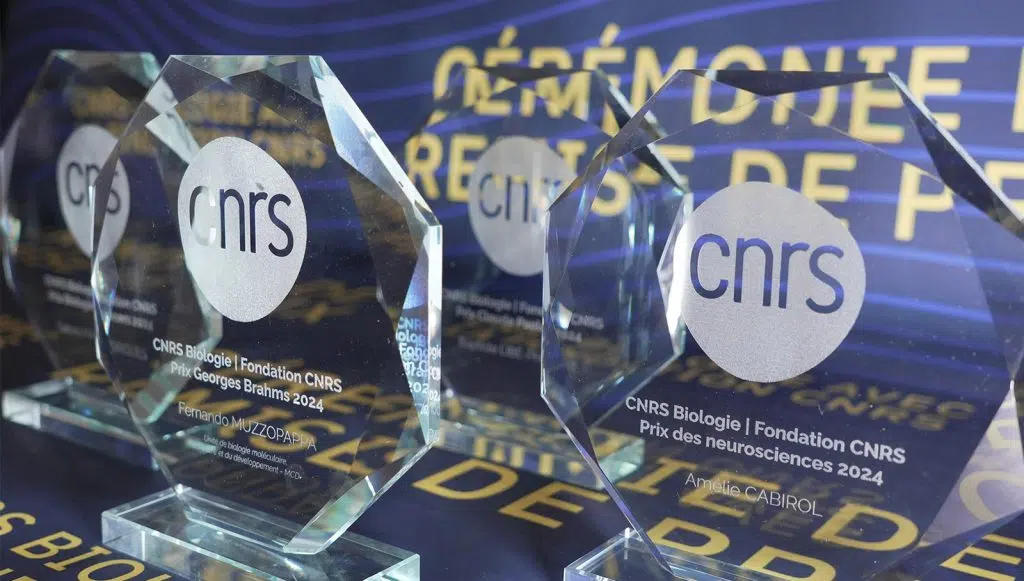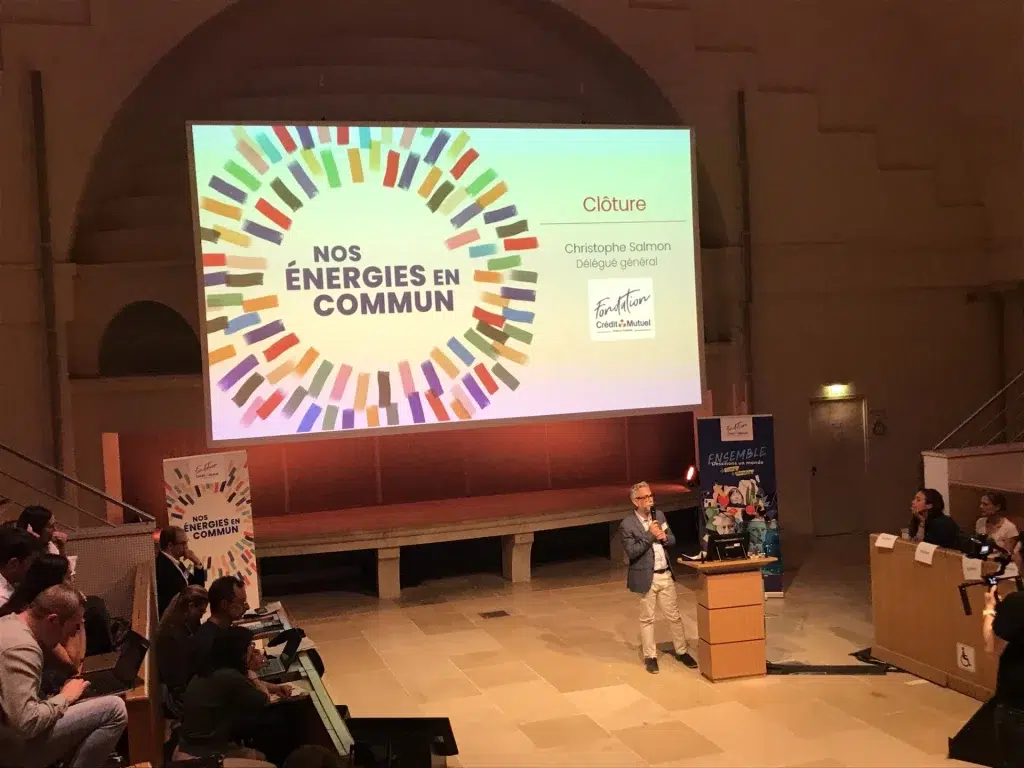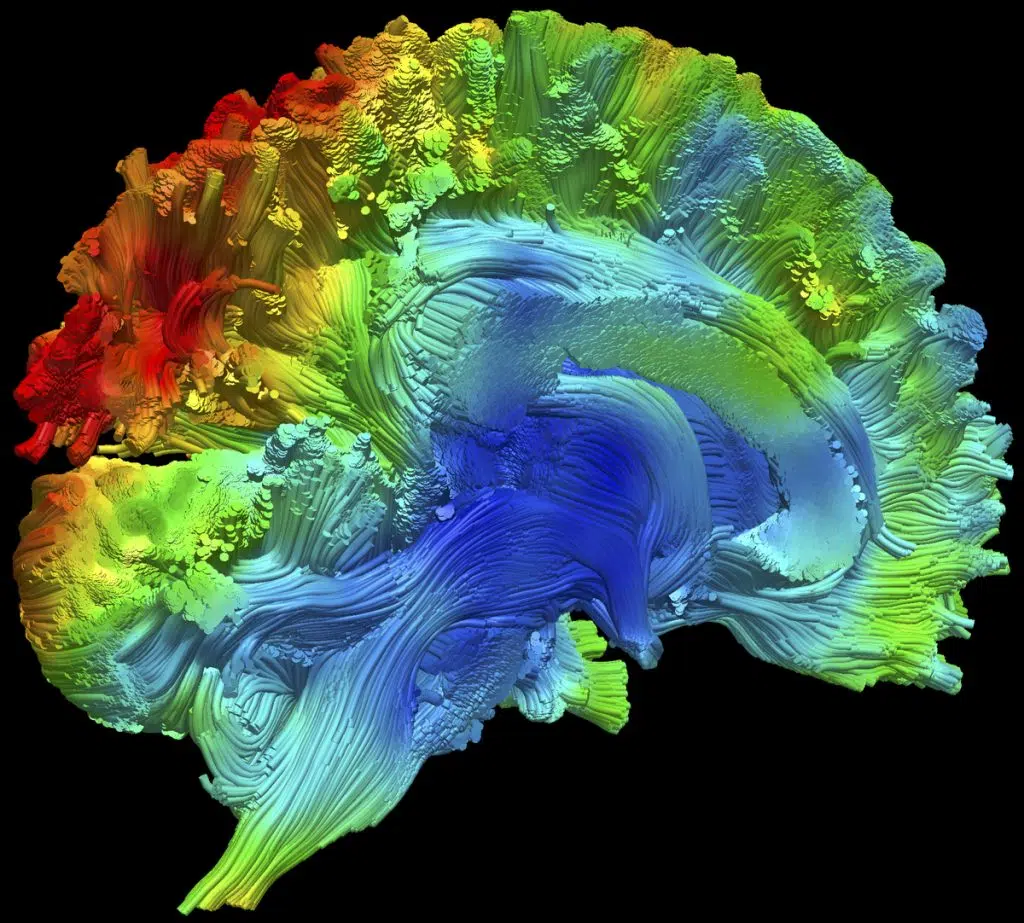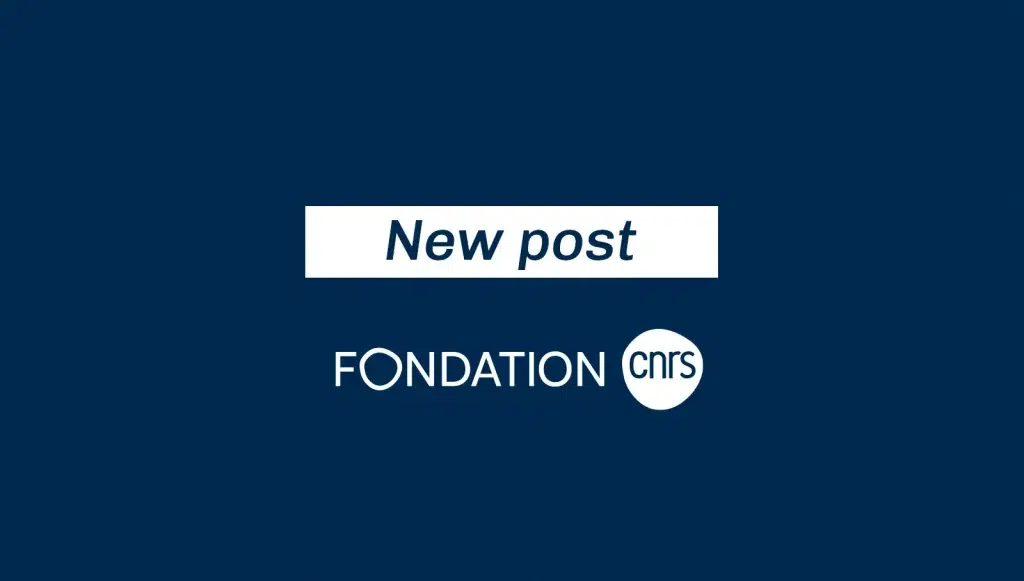On November 6, 2024, CNRS Biology and the CNRS Foundation organized an awards ceremony at the Gérard Mégie Campus in Paris, for the Claude Paoletti, Georges Brahms, Cancer Biology and Neuroscience Prizes. These prizes highlight the excellence of the work of new generations of researchers. The funding of these prizes is an integral part of the CNRS Foundation’s mission to support young talent. The CNRS Foundation would like to thank its donors who, through their donations and bequests, have made it possible to set up the fund dedicated to financing these prizes, in particular the new prizes created in 2024 on Cancer Biology and Neuroscience.
Congratulations to our 2024 winners:
– Morgane Thion and Baptise Libé-Philippotfor the Claude Paoletti Prize,
– Fernando Muzzopappa for the Georges Brahms Prize,
– Julie Leca and Gabriel Matos Rodrigues for the Cancer Biology Prize,
– Amélie Cabirol and Simon Nougaret for the Neuroscience Prize.
Claude Paoletti Prize
The Claude Paoletti Prize, created in tribute to Claude Paoletti, former Director of the CNRS Life Sciences Department, is awarded each year to promising young scientists at the start of their careers in all areas of biology. This year, the prizes were awarded to Morgane Thion and Baptiste Libé-Philippot.
- Morgane Thion completed a postdoctoral fellowship in Sonia Garel’s team at the Institut de Biologie de l’École normale supérieure, studying the development of microglia, the brain’s main immune cells. Recruited by the CNRS as a research fellow in 2018, she set up a new research team at the Collège de France’s Centre interdisciplinaire de recherche en biologie, which she has co-directed since 2023.
- Baptiste Libé-Philippot is an alumnus of the École normale supérieure. D. at the Institut Pasteur, where he studied the role of deafness genes in the development of the auditory cortex. He was then a postdoctoral researcher at VIB/KU Leuven, Belgium. In 2024, he joined the CNRS as a research fellow and set up his “Evolution of human neurons” team at the Institut de biologie du développement in Marseille, supported by ATIP-Avenir and the European Research Council.
Georges Brahms Prize
The Georges Brahms Prize of the CNRS Foundation, created in memory of Georges Brahms, researcher and great patron of the arts, is awarded each year to a researcher in the field of DNA biology. The €10,000 prize is intended to support the installation of the winner. This year, the prize was awarded to Fernando Muzzopappa.
- Fernando Muzzopappa obtained his PhD in 2019 at the Institut de Biologie Intégrative de la Cellule, I2BC, Gif-Sur-Yvette. He then joined the laboratory of Fabian Erdel, CNRS research director at the Unité de Biologie Moléculaire, Cellulaire et du Développement (MCD), Toulouse, to study the organization of heterochromatin in mammals as a postdoctoral researcher, where he obtained a position as CNRS research fellow. His research project aims to use multidisciplinary approaches to understand how the molecular interaction between proteins can lead to the compartmentalization of the genome into active and inactive regions, and regulate the cell’s transcriptional program.
Cancer Biology Prize
The Cancer Biology Prize, created in 2024, is awarded to young scientists, newly recruited as research fellows in CNRS Biology laboratories, and dedicated to the study of cancer biology. This year’s awards went to Julie Leca and Gabriel Matos Rodrigues.
- Julie Leca trained as an immunologist, and her thesis, carried out at the Centre de recherche en cancérologie de Marseille, focused on the study of the dialogue between tumor cells and their microenvironment in pancreatic cancer. She then joined the Princess Margaret Cancer Centre (Toronto) for her post-doctorate, where she studied IDH mutations in the context of hematological diseases. She obtained a CNRS research fellowship to continue her study of IDH mutations in acute myeloid leukemia at the Lyon Cancer Research Center.
- Gabriel Matos Rodrigues obtained his PhD from the Université Paris-Saclay and moved to the USA to join the Institut National du Cancer for his postdoctoral training. In 2024, he was recruited by the CNRS as a research fellow in the Genome Integrity and Cancer Laboratory and at the Institut Gustave Roussy as head of the ATIP-avenir team. He explores the mechanisms of genomic instability and their impact on cancer and aging.
Neuroscience Awards
The Neuroscience Prize, created in 2024, is intended to highlight the contributions of young researchers recruited from CNRS Biologie laboratories, working in the field of neuroscience. This prize supports the exploration of brain mechanisms and the challenges of neurobiology, a constantly evolving field. This year’s awards went to Amélie Cabirol and Simon Nougaret.
- Amélie Cabirol is a neuroethologist specializing in the study of the gut microbiota-brain axis in honeybees. She completed her thesis on the neurobiology of learning in this insect, then pursued this theme as a post-doctoral fellow in Albrecht Haase’s group. In 2020, she was awarded a Marie Skłodowska-Curie fellowship to initiate her research on the gut microbiota-brain axis in Philipp Engel’s team. She is recruited as a CNRS research fellow at the Centre de recherches sur la cognition animale , and awarded an ERC Starting Grant.
- Simon Nougaret completed his thesis at the Institut de neurosciences de la Timone. He focused on the role of the basal ganglia in motivational processes. He then worked at the University of Rome “La Sapienza” on the representation of self and others in the frontopolar cortex. He then explored the encoding of motor planning in terms of cortical layers and frequency specificity in INT. In 2024, he obtained a CNRS research fellowship and continues his work at INT.
Photo credit © Marie Origas, 2024




